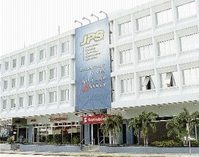JPS revenue hobbled by fuel savings
Published: Wednesday | July 8, 2009

Jamaica Public Service Company Limited - File
Operationally, Jamaica Public Service Company (JPS) is reporting a profit of US$22 million (J$1.95 billion) in its first quarter ending March 31, 2009, but with liabilities that track about six times earnings and a multimillion exposure to foreign exchange risk, the utility, on a net basis, has done very poorly in the period.
JPS closed the quarter US$1.6 million (J$142 million) in the red - compared to a profit of US$5.6 million in the March 2008 period - the result of financing charges of US$24.5 million that included more than US$16.4 million of foreign exchange losses. (Forex conversion: Mar '09 - US$1:J$88.82; Mar '08: US$1:J$71.09).
JPS, for which a 40 per cent share sale to Taqa of the United Arab Emirates was finalised March 18, had a much lower fuel bill in the review quarter of US$76.4 million (Q108: US$146.5m), but by passing on some of the energy savings to electricity consumers, the monopoly electricity supplier had 30 per cent less revenue flowing to its bank accounts.
Top-line income in the March quarter topped US$158.3 million, but that was down from US$225.5 million in the comparative 2008 period.
In JMD terms, however, the gap in revenue was far less substantial, down by 12 per cent from $16 billion to $14 billion, suggesting that as much as three-fifths of the decline was due to forex conversion.
Falling cost
That aside, Winsome Callum, the head of communications at the utility company, said the lower turnover was not related to sales, which she said was flat in the period, but more so the falling cost of energy. JPS treats its fuel bill as a pass-through cost to consumers.
Last year, JPS, which began reporting its earnings in USD terms last year, made US$8.8 million (J$712 million) of profit at yearend December 2008, off US$988.2 million of revenues, with the first-quarter results equivalent to 63 per cent of profit.
That outcome happened in a year when oil prices climbed on world markets to as high as US$147 per barrel last July, pushing up petroleum-based products alongside it.
The fuel component of JPS's billed charges rose to $20.32 per kWh in August 2008 as a result, but as oil price began the descent from its intoxicating high, so did the fuel charges, which in January 2009 were quoted at $8.65 per kWh.
Oil prices fell as low as US$34 earlier this year but have since redoubled to about US$70, and the Jamaican currency has stabilised at or around $89 to the USD, offering a window for JPS to re-energise its top-line performance.
Current value
Callum said that with oil prices trending upwards, the fuel rate will rise again, and with it JPS revenues, reiterating that JPS does not profit from the fuel charges.
The utility company, whose ownership structure has been shifting since 2001 when Jamaica privatised the company, is now valued on its balance sheet at US$712 million (J$63 billion).
The company remains highly leveraged with rising long- and short-term loans of US$286 million at March 2009, or 40 per cent of net assets, compared to US$274 million a year earlier, or 37 per cent of assets.
lavern.clarke@gleanerjm.com
JPS ownership structure
Marubeni Corporation
| 8.73 billion shares | 40% |
Abu Dhabi National Energy Company (Taqa) 8.73 billion shares | 40% |
Government of Jamaica 4.34 billion shares | 19.9% |
Individuals 21.8 million shares | 0.01%
Site comments powered by Disqus
|





















